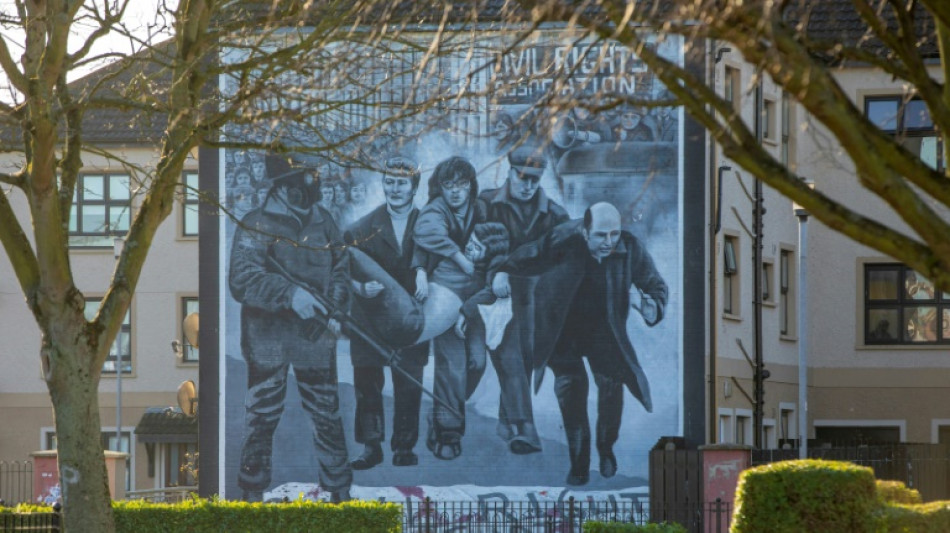
-
 Ice-cool Rybakina beats Sabalenka in tense Australian Open final
Ice-cool Rybakina beats Sabalenka in tense Australian Open final
-
Pakistan attacks kill 15, dozens of militants dead: official
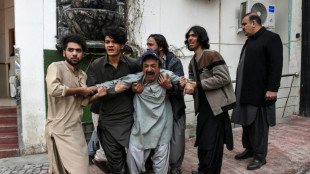
-
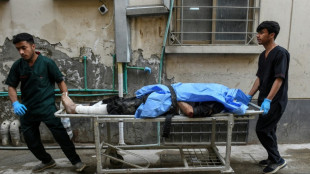 Ten security officials, 37 militants killed in SW Pakistan attacks: official
Ten security officials, 37 militants killed in SW Pakistan attacks: official
-
Epstein survivors say abusers 'remain hidden' after latest files release

-
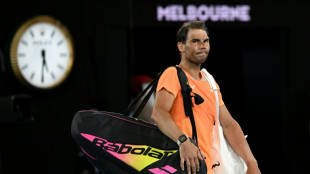 'Full respect' for Djokovic but Nadal tips Alcaraz for Melbourne title
'Full respect' for Djokovic but Nadal tips Alcaraz for Melbourne title
-
Wollaston goes back-to-back in the Cadel Evans road race

-
 Women in ties return as feminism faces pushback
Women in ties return as feminism faces pushback
-
Ship ahoy! Prague's homeless find safe haven on river boat

-
 Britain's Starmer ends China trip aimed at reset despite Trump warning
Britain's Starmer ends China trip aimed at reset despite Trump warning
-
Carlos Alcaraz: rare tennis talent with shades of Federer

-
 Novak Djokovic: divisive tennis great on brink of history
Novak Djokovic: divisive tennis great on brink of history
-
History beckons for Djokovic and Alcaraz in Australian Open final

-
 Harrison, Skupski win Australian Open men's doubles title
Harrison, Skupski win Australian Open men's doubles title
-
Epstein offered ex-prince Andrew meeting with Russian woman: files

-
 Jokic scores 31 to propel Nuggets over Clippers in injury return
Jokic scores 31 to propel Nuggets over Clippers in injury return
-
Montreal studio rises from dark basement office to 'Stranger Things'

-
 US government shuts down but quick resolution expected
US government shuts down but quick resolution expected
-
Mertens and Zhang win Australian Open women's doubles title

-
 Venezuelan interim president announces mass amnesty push
Venezuelan interim president announces mass amnesty push
-
China factory activity loses steam in January

-
 Melania Trump's atypical, divisive doc opens in theatres
Melania Trump's atypical, divisive doc opens in theatres
-
Bad Bunny set for historic one-two punch at Grammys, Super Bowl

-
 Five things to watch for on Grammys night Sunday
Five things to watch for on Grammys night Sunday
-
Venezuelan interim president proposes mass amnesty law

-
 Rose stretches lead at Torrey Pines as Koepka makes cut
Rose stretches lead at Torrey Pines as Koepka makes cut
-
Online foes Trump, Petro set for White House face-to-face

-
 Seattle Seahawks deny plans for post-Super Bowl sale
Seattle Seahawks deny plans for post-Super Bowl sale
-
US Senate passes deal expected to shorten shutdown

-
 'Misrepresent reality': AI-altered shooting image surfaces in US Senate
'Misrepresent reality': AI-altered shooting image surfaces in US Senate
-
Thousands rally in Minneapolis as immigration anger boils

-
 US judge blocks death penalty for alleged health CEO killer Mangione
US judge blocks death penalty for alleged health CEO killer Mangione
-
Lens win to reclaim top spot in Ligue 1 from PSG

-
 Gold, silver prices tumble as investors soothed by Trump Fed pick
Gold, silver prices tumble as investors soothed by Trump Fed pick
-
Ko, Woad share lead at LPGA season opener

-
 US Senate votes on funding deal - but shutdown still imminent
US Senate votes on funding deal - but shutdown still imminent
-
US charges prominent journalist after Minneapolis protest coverage

-
 Trump expects Iran to seek deal to avoid US strikes
Trump expects Iran to seek deal to avoid US strikes
-
US Justice Dept releases documents, images, videos from Epstein files

-
 Guterres warns UN risks 'imminent financial collapse'
Guterres warns UN risks 'imminent financial collapse'
-
NASA delays Moon mission over frigid weather

-
 First competitors settle into Milan's Olympic village
First competitors settle into Milan's Olympic village
-
Fela Kuti: first African to get Grammys Lifetime Achievement Award

-
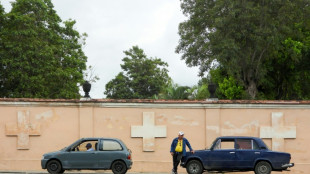 Cubans queue for fuel as Trump issues oil ultimatum
Cubans queue for fuel as Trump issues oil ultimatum
-
'Schitt's Creek' star Catherine O'Hara dead at 71

-
 Curran hat-trick seals 11 run DLS win for England over Sri Lanka
Curran hat-trick seals 11 run DLS win for England over Sri Lanka
-
Cubans queue for fuel as Trump issues energy ultimatum

-
 France rescues over 6,000 UK-bound Channel migrants in 2025
France rescues over 6,000 UK-bound Channel migrants in 2025
-
Surprise appointment Riera named Frankfurt coach

-
 Maersk to take over Panama Canal port operations from HK firm
Maersk to take over Panama Canal port operations from HK firm
-
US arrests prominent journalist after Minneapolis protest coverage


'Bloody Sunday': 10 minutes of killing that shook N.Ireland
"Bloody Sunday" was a turning point in three decades of violence in Northern Ireland known as the "Troubles".
On Sunday January 30, 1972, British paratroopers shot dead 13 Catholic demonstrators in the province's second city, Londonderry.
Here is how events unfolded:
- Peaceful march -
The Northern Ireland Civil Rights Association (NICRA) organised an anti-internment march to take place that day in the city Catholics call Derry.
They were angry at the increasing internment without trial of Catholic nationalists since the previous August.
The march was illegal. Northern Ireland's Protestant authorities had declared a year-long ban on all marches amid spiralling unrest since civil rights protesters began demanding an end to voting, housing and job discrimination against the minority Catholic community in 1968.
Nevertheless, at least 15,000 people joined the march, which set off in a carnival-like mood from the Creggan Estate, a few kilometres from the city centre, through the Catholic Bogside district to Guildhall Square.
Crack troops from the British 1st Battalion Parachute Regiment, drafted in that day, were waiting at barricades to stop the march reaching the city centre.
- Confrontation -
A section of the crowd turned into William Street and youths began throwing stones at a British army barricade.
Troops were ordered to begin arrests and armoured cars drove into the crowd.
Around 4:10 pm soldiers started firing.
Within about 10 minutes 13 people were dead and a further 15 injured. Six of the dead were aged 17.
- 'Whitewash' -
The troops claimed to have come under sustained gunfire as well as attacks with nail bombs. They said they aimed away from the demonstrators.
Their claims, largely accepted in the official report by senior English judge John Widgery, published later that year, were not backed up by independent accounts.
No soldiers were injured in the operation and no guns or bombs recovered.
The victims' families derided the report as a "whitewash".
- Explosion in violence -
The killings proved a boon to the nascent Provisional Irish Republican Army, fighting for Northern Ireland's reunification with Ireland, whose ranks swelled with new recruits.
On February 2, an angry crowd set fire to the British embassy in Dublin.
On March 24, London suspended the Protestant-dominated Northern Ireland provincial government, leading to decades of direct rule from the British capital.
- Apology -
In June 2010 a new report published after a 12-year investigation said British troops fired first and had given misleading accounts of what happened.
The report by senior British judge Mark Saville concluded that none of the victims was armed, soldiers gave no warnings before opening fire and the shootings were a "catastrophe" for Northern Ireland and led to increased violence.
Following the report then British prime minister David Cameron apologised for the killings, saying: "There is no doubt... what happened on 'Bloody Sunday' was both unjustified and unjustifiable. It was wrong."
- Ex-soldier charged -
On March 14, 2018 an ex-paratrooper, known only as Soldier F, was charged with murdering two people and the attempted murder of four others.
But the charges were dropped in July 2021 after a backlash by MPs from Britain's ruling Conservative Party.
"Bloody Sunday", immortalised by a song by Irish rock group U2, was one of the darkest episodes in the conflict between Northern Ireland's Catholic nationalists -- who want a united Ireland -- and Protestant unionists loyal to Britain.
J.Bergmann--BTB



